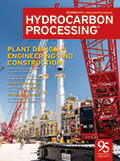
Special Focus: Plant Design, Engineering and Construction
A proprietary slurry technology<sup>a</sup> represents an innovation in residue conversion and unconventional oil upgrading, and marks a step change in the treatment of the heavy end of the barrel.
Construction is essentially a cyclical business.
This two-part article will examine how to address common issues on large projects, and how to make an ordered, structured transition in a systematic and repeatable way.<sup>a</sup>
For refineries and petrochemical plants, turnarounds (TARs) are a necessary, and stressful, activity.
As crude oil prices decline, consumption of petroleum fuels is increasing.
HP Top Project Awards 2017
The global hydrocarbon processing industry (HPI) continues to expand and modernize to efficiently meet growing demand for energy, transportation fuels and petrochemicals.
Process Optimization
Due to reduced margins, higher energy costs and rising atmospheric carbon dioxide (CO<sub>2</sub>) content, energy efficiency has never been more important in refining and petrochemicals.
In today’s industrial environment, where refiners are struggling to improve gross refinery margins, around-the-clock process optimization is a must.
Maintenance and Reliability
Past corrosion incidents provide insight into the causes of corrosion and the preventive actions required to protect plant equipment and reduce costly plant downtime.
Coke drums and delayed coking units (DCUs) have been a recognizable technology in refineries since the 1930s, and in oil sands plants since the early 1960s.
Environment and Safety
Performing damage mechanism reviews (DMRs) to determine credible degradation modes and susceptibilities of processing equipment has become an important step in developing effective mechanical integrity plans in the refining, chemical processing and related industries.
Petroleum is a complex hydrocarbon mixture that contains small amounts of organic acids, such as naphthenic acids and phenols.
Columns
What is the state of the global hydrocarbon processing industry (HPI)?
In August 2017, a publisher-colleague and I attended an important regional reliability conference in Galveston, Texas.
Not a day passes without publications, the blogosphere and pundits wringing their hands over the concept of fuel blending. In today’s low-priced crude oil market, the fuel blending business gives blenders a competitive edge that grows every day, attracting new customers and potential new producers intrigued by the possibility of making “easy” money.
The Russian government’s recent decision to raise the excise tax on motor fuel by 1 RUB/l in 2018 may lead to serious losses for the country’s domestic refining industry.
The drop in crude oil prices, a growing transportation sector and an underperforming crude processing industry have created a strong demand for additional storage facilities in Africa, which is the preferred method of meeting fuel consumption requirements.
Trends and Resources
According to Hydrocarbon Processing’s Construction Boxscore Database, more than 770 new projects have been announced over the past 3 yr.
Propylene demand has been increasing rapidly in recent years, and traditional processes are struggling to keep up.
The US saw solid product demand, despite a decline following the end of the driving season, and reduced scheduled maintenance lent some support.
<i>Hydrocarbon Processing</i>’s Construction Boxscore Database is tracking more than 1,700 active downstream projects around the world.
In the demanding environment of a Claus reaction furnace, flame detection sensors must distinguish whether a flame is still burning against a hot refractory lining background.

- INEOS receives €300-million grant to rejuvenate and decarbonize its Lavera plant 2/19
- AGC Vinythai commissions expanded chlor-alkali plant and e-BiTAC electrolyzers from thyssenkrupp nucera 2/19
- BASF launches AdBlue GE (green electricity) to decarbonize mobility value chain 2/19
- Carbon Neutral Fuels select Johnson Matthey, bp and Honeywell UOP technologies for UK SAF plant 2/19
- ExxonMobil starts operations on second carbon capture project in Louisiana (U.S.) 2/19
- Pall introduces two new technologies to reduce CAPEX and TCO in oil and gas processing 2/19




